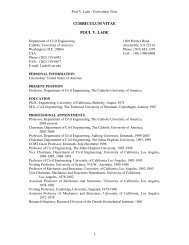Nota Bene-- C:\ARTICLES\TERMIN~1.NB Job 1 - the Catholic ...
Nota Bene-- C:\ARTICLES\TERMIN~1.NB Job 1 - the Catholic ...
Nota Bene-- C:\ARTICLES\TERMIN~1.NB Job 1 - the Catholic ...
Create successful ePaper yourself
Turn your PDF publications into a flip-book with our unique Google optimized e-Paper software.
far from you. It is not in heaven above, (that you should be) saying, ‘Who will ascend<br />
for us into heaven and will receive it for us?--that on hearing it we might do (it).’” 30 But<br />
<strong>the</strong> righteousness from faith supplants <strong>the</strong> statements about Israel receiving, hearing,<br />
and doing <strong>the</strong> commandment(s) of <strong>the</strong> Law with a statement of what God has done in<br />
<strong>the</strong> Christ event: “‘Who will ascend into heaven?,’ that is, to bring Christ down” (Rom<br />
10:6). 31<br />
“Who will ascend (α� ναβη' σεται) into heaven?” reminds <strong>the</strong> audience that Moses<br />
“ascended” (α� νε'βη) “to <strong>the</strong> mountain of God” in Exod 19:3 (LXX). In Exod 19:20 <strong>the</strong><br />
Lord called Moses to <strong>the</strong> top of <strong>the</strong> mountain, and Moses “ascended” (ανε'βη). The<br />
mountain refers to Mt. Sinai, often associated with heaven in <strong>the</strong> biblical tradition. 32 In<br />
bringing Christ down from heaven, God has supplanted <strong>the</strong> commandment of <strong>the</strong> Law<br />
that Moses brought down from heaven so that Israel could do (ποιη' σοµεν) it (Deut<br />
30:12)--in accord with what Moses wrote about <strong>the</strong> righteousness from <strong>the</strong> Law,<br />
namely, that <strong>the</strong> person who does (ποιη' σας, Lev 18:5) <strong>the</strong>se (commandments of <strong>the</strong><br />
Law) will live by <strong>the</strong>m (Rom 10:5). In supplanting <strong>the</strong> commandment(s) with Christ, God<br />
has thus brought an end to <strong>the</strong> need to do <strong>the</strong> works of <strong>the</strong> Law for righteousness. 33<br />
The righteousness from faith continues to alert Israel as to what <strong>the</strong>y should not<br />
say in <strong>the</strong>ir heart: “Or, ‘Who will descend into <strong>the</strong> abyss?’” (Rom 10:7a). Within <strong>the</strong><br />
scriptural exegesis this question corresponds to Deut 30:13 (LXX): “Nor is (<strong>the</strong><br />
commandment) across <strong>the</strong> sea (that you should be) saying, ‘Who will cross for us to <strong>the</strong><br />
o<strong>the</strong>r side of <strong>the</strong> sea and receive it for us?--so that he will cause it to be heard by us,<br />
that we may do (it).’” But <strong>the</strong> righteousness from faith again supplants <strong>the</strong> statements<br />
about Israel receiving, hearing, and doing <strong>the</strong> commandment(s) of <strong>the</strong> Law with ano<strong>the</strong>r<br />
statement of what God has done in <strong>the</strong> Christ event: “‘Who will descend into <strong>the</strong><br />
abyss?,’ that is, to bring Christ up from <strong>the</strong> dead” (Rom 10:7).<br />
The reason crossing <strong>the</strong> sea (θαλα' σσης, Deut 30:13) has been altered to<br />
descending into <strong>the</strong> abyss (α»βυσσον, Rom 10:7) is to make it conform more closely to<br />
12
















